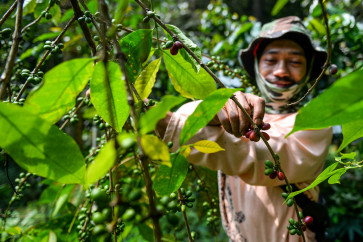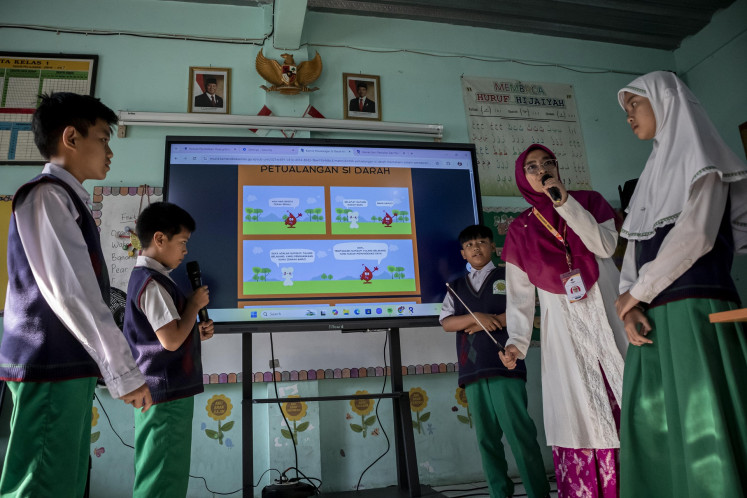Ron Jenkins: Art and culture as powerful weapons
JP/Ni Komang ErvianiRon Jenkins’ love affair with Bali’s arts and culture is deep and intense
Change text size
Gift Premium Articles
to Anyone

JP/Ni Komang ErvianiRon Jenkins’ love affair with Bali’s arts and culture is deep and intense.
For more than 30 years, Jenkins, a professor of theater at Wesleyan University in the United States, has studied and translated works from Balinese theater and literature into English.
He has also directed and performed in Balinese traditional plays before international audiences.
Jenkins is viewed as one of the most acclaimed figures in the international theater world.
Jenkins was recently at Bali’s Cultural Office in Denpasar to discuss a “gigantic” project to digitalize thousands of ancient Balinese lontar manuscripts and upload them into a virtual library.
Jenkins flipped through his book, co-authored with Balinese scholar I Nyoman Catra, titled Invisible Mirror — Siwaratrikalpa as the reflection of the Balinese soul.
In the book, Jenkins’s quotes his mentor and friend, Ida Pedanda Ketut Kencana Singarsa, a respected Hindu high priest from Griya Taman Sari in Sanur, as saying:
“Translating lontar can help us to remember the importance of the invisible world in solving our problems. If you want to see the reflection of the human body, look in a mirror, if you want to see a reflection of the human mind, look at lontar.”
Jenkins said that the words inspired him to launch his Saraswati Project. Saraswati is the goddess of wisdom, learning and music in Balinese Hinduism. She is also the guardian deity of all manuscripts.
“The priest’s words are the heart and the essence of this project — translating lontar, which are the sources of wisdom about the invisible world, or niskala, in Balinese.”
He said that lontar and other literary works such as plays and poems contain philosophy and wisdom that can provide solutions to many of the problems of modern life.
“In Bali, I am learning more about art as a senjata kebudayaan, or cultural weapon, by studying lontar.”
He came to Bali in 1976 under a fellowship from the Watson Foundation and Margaret Mead’s Institute for Intercultural Study to study Bali’s performance tradition.
“I began my professional career as a circus clown and first came to Bali to study the tradition of the penasar clown characters,” Jenkins said.
He stayed in Batuan village in Ubud, Gianyar, for a year and studied Topeng traditional Balinese mask making with masters Pak Made Jimat and his mother, the late Ibu Cenik.
Jenkins also worked with other artists such as I Made Bandem, I Nyoman Catra and many others.
He returned to the US to get a doctorate from Harvard University.
“When I was a child I would always visit my Italian grandmother with a book in my hand, so she would call me piccolo professore, or “the little professor.”
His grandmother’s nickname augured the shape of things to come, Jenkins became a theater professor at Wesleyan University.
“My teachers were my heroes, so becoming a teacher was a dream comes true.”
Jenkins later spent a year in Italy studying with the Italian playwright and Nobel laureate Dario Fo, who, like the Balinese penasar, combined slapstick comedy with sophisticated social commentary.
He translated many of Fo’s plays into English and directed them in American theaters with the support of a Guggenheim Fellowship and other grants.
“After Fo won the Nobel Prize in literature I realized that some of the Balinese performers I knew, like the dalang puppet master Cenk Blonk [I Wayan Nardayana], were creating theater that was just as sophisticated as Fo’s work in Italy.”
Dalang Cenk Blonk derived his stories from lontar and wittily addressed contemporary social problems such as corruption, terrorism and the environment to make a smooth connection between everyday activities and ancient wisdom.
But, Jenkins said, nobody was translating Balinese works into English, so the full extent of their linguistic accomplishments was never recognized abroad.
Jenkins said that people in America did not know that the Balinese were great dancers and that foreigners do not understand what the dalang and penasar clown characters are saying.
“I decided to work on translating some representative performances, hoping that one day a Balinese artist might win the Nobel Prize.”
Together with Nyoman Catra, Jenkins made English translations of different performances that were adapted from the Siwaratri Lontar shadow puppet plays, broadcasts from the state-owned radio station, poems and plays.
In collaboration with Balinese artists, Jenkins also adapted Calonarang, or The Witch Queen, with William Shakespeare’s comedy The Tempest in New York City.
Jenkins said the more he worked with foreign artists the more he recognized the power of the art to create a balanced and peaceful world.
“When I went to South Africa before the end of apartheid and observed how the black majority used theater and art to fight for freedom. It taught me that art could be a weapon that could be wielded with more dignity than a gun.”
He saw the same connection between art and survival when he visited Lithuania while it was still under Soviet occupation.
In Bali, he said he drew valuable lessons on the power of the art to heal people’s agony and mend the island after it suffered terrorist bombings in October 2002 and October 2005.
“Instead of taking physical revenge or attacking these terrorists, the Balinese people solemnly and elegantly answered the attacks with rituals, arts, literature and performances.”
Jenkins wrote in The New York Times that performers in temple courtyards, village halls and on television frequently used traditional Balinese theater forms — masked comedies, shadow plays and folk operas — to discuss to the attack and its aftermath.
“Maybe the bombers wanted to create chaos and fighting between Hindus and Muslims,” Made Sumadi, an official in the Religious Affairs Ministry’s Bali office, said. “But we did not respond the way the bombers expected. In Bali we responded to violence with peace. The bombs had a great impact on everyone, but it could not stop our performances.”
Another response took place on Nov. 15, 2002, when purification ceremonies, accompanied by theater, music and dance performances, were staged in every village across the island to ward off evil influences.
“The Balinese use culture as their weapon and the island become stronger when it uses that weapon. So this is a great lesson that will be good for other countries.”









